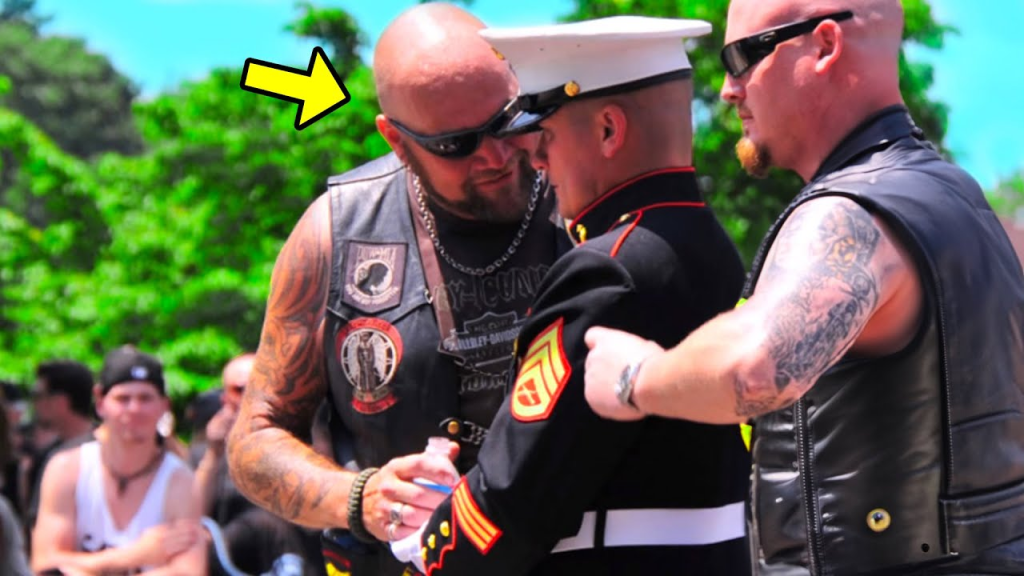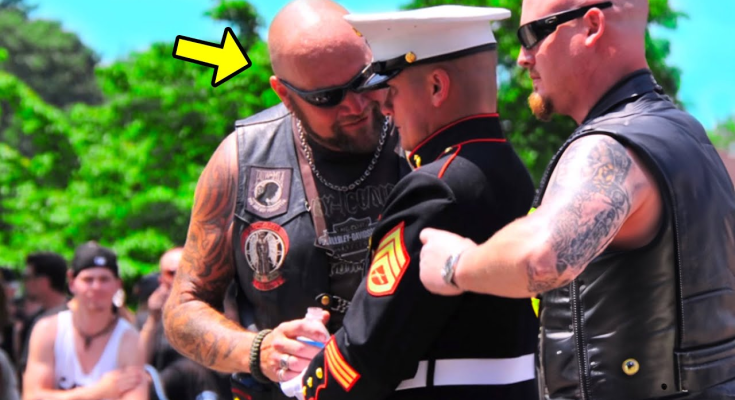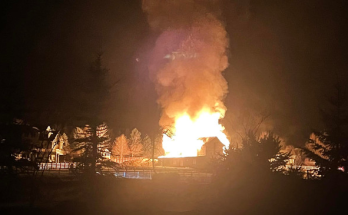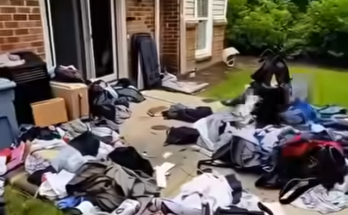
The town square was quiet except for the hum of traffic and the occasional clap of flags caught in the Memorial Day breeze. On one corner, under the punishing sun, a man stood at attention.
He wasn’t dressed in ceremony blues, nor did he wear any official uniform. His faded cargo pants bore stains of use, his plain shirt clung to his frame in the heat. But his posture was unmistakable—rigid, proud, unyielding. His right hand was locked in a salute, fingers pressed sharply against his brow.
He was a Marine, or at least he had been.
The scars of his service still clung to him. A jagged limp when he’d walked into position. A brace on his left knee. A deep line of pain across his face as the minutes bled into hours. But nothing—not the pain, not the heat, not the tremor in his arm—could break his salute.
He had promised himself he would stand there for three hours. Three hours to honor the brothers and sisters who never came home. Three hours for the names etched on white stone in cemeteries across the country. Three hours for those who gave everything.
The people passing by slowed when they saw him. Some paused to whisper. A few placed their hands over their hearts. Children tugged at parents, asking why the man didn’t move. And slowly, a small crowd formed—watching the Marine as though watching something sacred.
The Struggle

Two hours in, sweat drenched his shirt. His injured leg shook violently beneath his weight. He tried to shift without breaking form, but the pain was a fire climbing through his bones. Still, his hand remained raised.
Whispers rippled through the crowd. Some urged him to sit, others offered water, but he refused to break. “Not yet,” he murmured once, his eyes fixed forward, the words barely audible.
A nurse in the crowd fretted over the way his lips were paling. A father hushed his children, teaching them respect in silence. People began filming, capturing not just a man, but the embodiment of endurance, sacrifice, and loyalty to something greater than himself.
Then, as the final hour approached, the sound of engines thundered in the distance.
The Arrival

They came in like a storm—chrome and leather gleaming in the sunlight, exhaust pipes roaring down the street. Dozens of motorcycles, their riders clad in leather vests marked with patches. The kind of patches people associated with trouble: outlaw clubs, rebels, men who didn’t bow to law or order.
The crowd stiffened. Parents pulled their children closer. The nurse stepped in front of the Marine instinctively, as though to shield him from what was coming.
The bikers slowed, their engines growling as they circled near the square. And then they stopped.
One by one, the riders dismounted. Boots struck pavement. Chains jingled at their sides. Their sunglasses hid their eyes, but their expressions were unreadable.
The Marine didn’t flinch. He kept his salute, though his arm was trembling now like a leaf in the wind.
The leader of the bikers—a massive man with a gray beard and tattoos creeping down his arms—stepped forward. The crowd braced, ready for confrontation.
Instead, the man removed his vest, placed it carefully on the ground in front of the Marine, and snapped to attention.
And then he raised his own hand in salute.
The Unthinkable

For a moment, the world seemed to pause. Then, without hesitation, the other bikers followed. They lined the sidewalk, shoulder to shoulder, leather vests glistening with patches of skulls and fire, but their posture was as disciplined and reverent as soldiers. Every single one raised their hand in salute.
The crowd gasped. Tears welled in strangers’ eyes. The whispers turned to silence as the square filled with the quiet dignity of dozens of hardened men standing alongside one Marine.
For the remaining hour, the Marine did not stand alone. His wavering legs held, his shaking arm steadied—not because the pain lessened, but because the burden was now shared.
The sun beat down, merciless. But in that moment, the heat didn’t matter. The scars didn’t matter. The stereotypes didn’t matter. What mattered was unity. What mattered was honor.
And when the Marine finally lowered his arm, three hours complete, he nearly collapsed. The nurse rushed forward, but it was the bearded biker who caught him, steadying him with surprising gentleness.
“You did good, brother,” the biker said, his voice gravelly but thick with respect.
The Marine, exhausted, simply nodded.
The Aftermath
The video spread within hours. Clips flooded social media—an injured Marine saluting for three hours, and the moment a group of bikers joined him in solidarity. People who had once dismissed the bikers as troublemakers saw them in a new light.
But to those who had been there, the moment wasn’t about going viral. It was about seeing something raw and unfiltered. About witnessing a man willing to endure agony for the sake of remembrance, and others willing to set aside their reputations to stand with him.
The Marine returned to his quiet life the next day. He never sought attention. He didn’t give interviews. He told those who asked only this:
“It wasn’t about me. It was about them—all of them. I just stood because they couldn’t. And those bikers—they understood that too.”
Legacy
Every Memorial Day after, the townspeople returned to that same square. Some brought flags, some brought flowers. But always, at least one Marine would be there, saluting. And always, before the hours were done, the roar of motorcycles would be heard in the distance.
Because what began as one man’s solitary tribute became something greater—an unspoken promise that no one would ever stand alone again.
And so, an injured Marine’s salute became more than just an act of endurance. It became a symbol. A reminder that sometimes, the strongest bonds are forged not in bloodlines or uniforms, but in shared respect for sacrifice.
A reminder that heroes come in many forms.
And that honor, when truly understood, can bring even the most unlikely of allies together.



